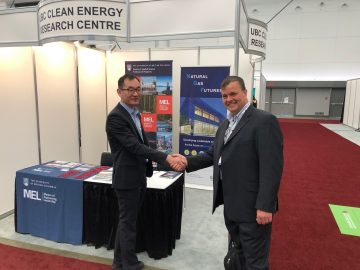On May 22, Natural Gas Futures convened a discussion panel on methane emissions detection and reduction at the Canada Gas & LNG Exhibition and Conference 2019. Five speakers representing the provincial government, technology developer and post-secondary institution presented the challenges, opportunities and progresses to meet the incoming methane emissions regulation.
Mr. Don D’Souza at the Climate Action Secretariat in British Columbia’s Ministry of Environment and Climate Change Strategy delivered a speech on the GHG emissions inventory in BC, federal and provincial methane emissions regulations, regulatory frameworks, and coordination of research efforts in BC to meet current and future methane emissions reduction targets.
Dr. Roger Beckie from the Department of Earth, Ocean and Atmospheric Sciences in the University of British Columbia (UBC) presented the ongoing investigations on gas well leakage, fugitive gas migration, and the origin of groundwater methane in the Peace Region.
Dr. Soheil Asgarpour from the Petroleum Technology Alliance Canada (PTAC) introduced PTAC’s methane emissions reduction applied research, and technology development, demonstration and deployment initiatives.
Dr. Naomi Zimmerman from the UBC Department of Mechanical Engineering presented her research on assessing fugitive methane emissions from three basins across the U.S. using mobile monitoring techniques. Dr. Zimmerman and her colleagues’ finding indicated lower production sites are disproportionately responsible for total fugitive methane emissions.
Dr. Patrick Kirchen, also from the UBC Department of Mechanical Engineering, presented his work on characterization and optimization of fuelling strategies for internal combustion engines using diesel and natural gas, development of low-cost and fast-acting emission sensors, and assessment of engine emissions and performance in real-world applications.
The Government of Canada is regulating methane emissions from upstream oil and gas sector with a reduction target of 40-45 percent from the 2012 level by 2025. As this timeline rapidly approaches, regulators, technology developers, operators, utilities and researchers need to work in a cohesive and collaborative manner to meet the regulation target. One of the core focus areas of Natural Gas Futures is to detect, quantify and reduce methane emissions throughout the natural gas supply chain. Encompassing world-class facilities and researchers, and close collaboration with industry and government, Natural Gas Futures strives towards the acceleration of the technology and policy development in managing methane emissions from the oil and gas industry.




0 Comments